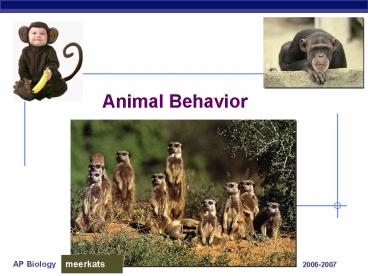Animal Behavior - PowerPoint PPT Presentation
1 / 31
Title: Animal Behavior
1
Animal Behavior
meerkats
2
What is behavior Why study it?
- Behavior
- everything an animal does how it does it
- response to stimuli in its environment
- innate inherited or developmentally fixed
- learned develop during animals lifetime
- Why study behavior?
- part of phenotype
- acted upon by natural selection
- lead to greater fitness?
- greater reproductive success?
- greater survival?
3
What questions do we ask?
- Proximate causes
- immediate stimulus mechanism
- how what questions
- Ultimate causes
- evolutionary significance
- how does behavior contribute to survival
reproduction - adaptive value
- why questions
- male songbird
- what triggers singing?
- ? how does he sing?
- ? why does he sing?
Courtship behavior in cranes ? whathow why
questions
- ? how does day length influence breeding?
- ? why do cranes breed in spring?
4
Ethology
1941 1973
- pioneers in the study of animal behavior
5
Types of behaviors
- Innate behaviors
- automatic, fixed, built-in
- despite different environments, all individuals
exhibit the behavior - triggered by a stimulus
- Learned behaviors
- modified by experience
- triggered by a stimulus
- variable
6
Innate behavior
male sticklebacks exhibit aggressive
territoriality
- Fixed action patterns (FAP)
- sequence of behaviors essentially unchangeable
usually conducted to completion once started - sign stimulus
- the releaser that triggers FAP
7
Fixed Action Patterns (FAP)
Digger wasp
egg rolling in geese
Do humans exhibit Fixed Action Patterns?
The eyebrow-flash
8
Directed movements
- Taxis
- change in direction
- automatic movement toward (positive taxis) or
away from (negative taxis) a stimulus - phototaxis
- chemotaxis
- Kinesis
- change in rate of movement in response to a
stimulus
9
Migration
- Complex behavior, but still innate
- migratory restlessness seen in birds bred
raised in captivity - navigate by sun, stars, Earth magnetic fields
ancient fly-ways
10
Imprinting
- Learning at a specific critical time forming
social attachments - both learning innate components
Konrad Lorenz
11
Conservation
Conservation biologists have taken advantage of
imprinting by young whooping cranes as a means to
teach the birds a migration route. A pilot
wearing a crane suit in an Ultralight plane
acts as a surrogate parent.
Wattled crane conservation
teaching cranes to migrate
12
Critical period
- Sensitive phase for optimal imprinting
As a brood parasite, the Cuckoo never learn the
song of their species as a nestling. Song
development is totally innate.
13
Learned behavior
- Associative learning
- learning to associate one feature of the
environment (stimulus) with another - operant conditioning
- trial error learning
- associate behavior with reward or punishment
- classical conditioning
- Pavlovian conditioning
- associate a neutral stimulus with a
significant stimulus
14
Operant conditioning
- Skinner box
mouse learns to associate behavior (pressing
lever) with reward (food pellet)
15
Classical conditioning
- Ivan Pavlovs dogs
- connect reflex behavior (salivating at sight of
food) to associated stimulus (ringing bell)
16
Habituation
- Loss of response to stimulus
- cry-wolf effect
- learn not to respond to repeated occurrences of
stimulus
17
Thinking problem-solving
- Do other animals think?
problem-solving
tool use
crow
18
Social behaviors
- Interactions between individuals
- develop as evolutionary adaptations
- language
- agonistic behaviors
- dominance hierarchy
- altruistic behavior
19
Language
- Honey bee communication
- dance to communicate location of food source
- waggle dance
20
Communication by song
- Bird song
- species identification mating ritual
- mixed learned innate
- critical learning period
- Insect song
- mating ritual song
- innate, genetically controlled
Red-winged blackbird
21
Social behaviors
- Agonistic behaviors
- threatening submissive rituals
- symbolic, usually no harm done
22
Social behaviors
- Dominance hierarchy
- social ranking within a group
- pecking order
23
Social behaviors
- Altruistic behavior
- reduces individual fitness but increases fitness
of recipient - kin selection
Belding ground squirrel
How can this be of adaptive value?
24
Social interaction requires communication
- Pheromones
- chemical signal that stimulates a response from
other individuals - alarm pheromones
- sex pheromones
25
Pheromones
Female mosquito use CO2 concentrations to locate
victims
marking territory
Spider using moth sex pheromones, as allomones,
to lure its prey
The female lion lures male by spreading sex
pheromones, but also by posture movements
26
Pheromones
- Human pheromones?
27
Social behaviors
- Cooperation
Pack of African dogs hunting wildebeest
cooperatively
White pelicans herding school of fish
28
Colonial mammals
convergent evolution bees, ants, termites mole
rats
- Naked mole rats
- underground colony, tunnels
- queen, breeding males, non-breeding workers
- hairless, blind
Picture a hot dog that's been left in a
microwave a little too longadd some buck teeth
at one end, and you've got a fairly good idea of
what a Naked Mole Rat looks like.
29
Territoriality
30
Mating parental behavior
- Genetic influences
- changes in behavior at different stages of mating
- pair bonding
- competitor aggression
- Environmental influences
- modifies behavior
- quality of diet
- social interactions
- learning opportunities
31
Any Questions??































